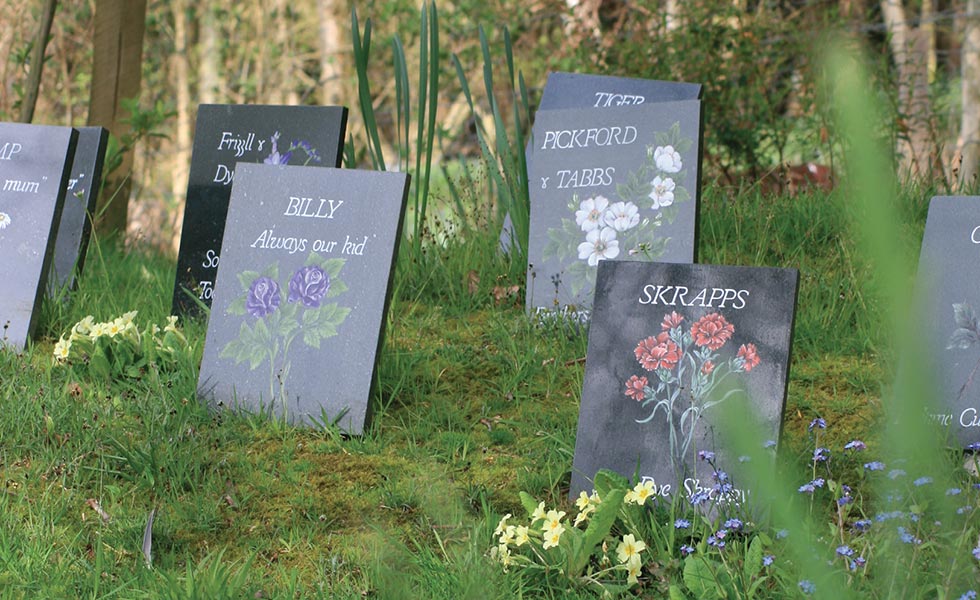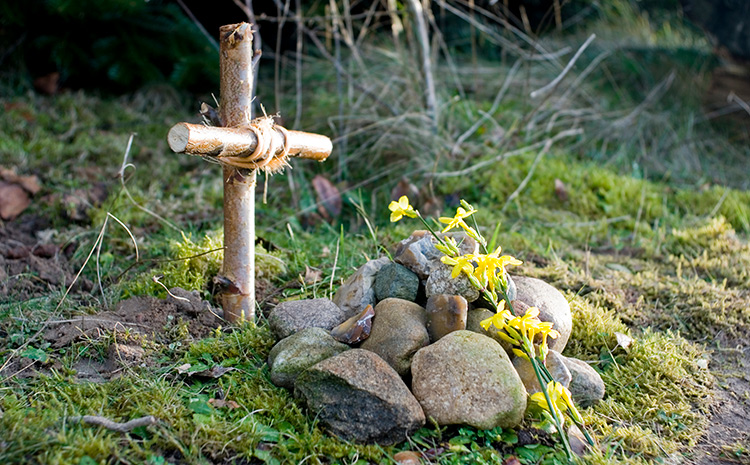Losing your cat is a terrible experience, but there are many ways to remember your cat. Here, we have advice about deciding on your cat's final resting place, pet cremations, and sentimental ways of remembering your cat.
Losing a pet is one of the most upsetting events we can experience. Take time to allow yourself to mourn, and don't be afraid to ask for help if you feel you need it.
Allow yourself to grieve the death of your cat
Unfortunately, some people who don't own animals can be rather unsympathetic at such a time, but grieving over a pet is a very valid emotional process.
To begin healing, you and other members of your family might need to talk to someone who understands. There are people who are trained in this area who are happy to listen and talk to you about your feelings.
How can I move on from the death of my cat?
Ceremonies often help us deal with loss and allow you to move on. If it's allowed where you live, you might want to bury your cat's remains or perhaps his collar and a favourite toy mouse. Some owners plant catnip over the spot or perhaps a rose bush.
Others take comfort from assembling a photo album or scrapbook about their cat. Pictures of him as a kitten and an adult enjoying life can evoke happy memories that can dull the sharp pangs of grief. Many people make a memorial donation to their local rescue centre - you will know what feels right to you.

What can I do to help remember my cat?
Create a scrapbook full of memories of your cat
Make a scrapbook or a memory journal. Fill it with pictures of your pet, notes and memories. Alternatively, you could create a memory box and include his collar, a favourite toy, pedigree certificate, and of course, photos.
Donate money to a cat charity
Make a donation to your favourite animal charity, or perhaps where you got your cat from. If your pet died from a specific disease, you could donate money to a charity like International Cat Care which supports specialist vets who seek to improve the knowledge on feline veterinary health matters, or to a charity which helps people who struggle with huge veterinary bills such Blue Cross.
Write down your feelings
Put your emotions in writing by composing a poem or story about your pet's life and what made him so special. You might even consider writing a letter to your departed pet, telling him how much you love and miss him.
Create a living memorial in memory of your cat
Let your pet's spirit live again by planting a tree, bush, or flowerbed in your garden. Alternatively, attach a small plaque to a flowerpot or vase in your home. Choose something you associate with your pet.
Frame a special photo of your cat
Have a photograph you particularly like of your cat enlarged and framed. There are all sorts of creative options for photographs these days. Alternatively, why not commission an artist to paint or draw a portrait from your favourite photograph?
Have your cat's ashes put into glass memorabilia
Carry your cat with you forever by turning a pet's ashes into cremation jewellery. There are many companies now that will be able to use a teaspoonful of your cat's ashes after cremation, and carefully create a memorial glass piece, which can be in the form of rings, pendants, paper weights, and many other pieces.

How can I decide on my cat’s final resting place?
Losing a much-loved pet is hard enough to cope with, without worrying about where their final resting place will be. Sue Corfield advises.
Amid the shock, grief, and dismay of loss, you need to tackle all the practical issues that follow the death of a pet. These can become a nightmare if you are unprepared, adding to your stress at the worst possible time.
When it comes to finding a final resting place for your pet, there are a number of options to consider.
Organising a burial to remember my cat
For as long as man has had pets, burial in the garden or on the owner's land has been commonplace. Many pet owners choose the traditional option of home burial as it keeps the final resting place close to them and enables them to personalise their own farewell.
However, as with many areas of life, there is legislation that may complicate matters. This centres around the placement of the grave as no animal should be buried close to any water courses.
The grave also needs to be quite deep with at least a couple of feet of earth above the pet to prevent scavengers from disturbing the remains.
The body should be wrapped in a towel or sheet for burial purposes. If in doubt, check with your local environment agency.
Donating my cat’s tissue after his death
It is possible to donate your pet's body to science where he or she can go on to help other pets in need of life-saving surgery.
Veterinary Tissue Bank, the UK's first ethical animal donor programme, was established by vets John Innes, former professor of surgery at University of Liverpool Veterinary School, and Dr Peter Myint, who has extensive experience managing and developing tissue banks for human procedures.
Mirroring the same principles and many of the supply problems that human tissue donation faces, the tissue bank needs owners to come forward to donate their deceased pets' soft tissue and bone tissue. It is then supplied to vets throughout the UK and Europe for surgical procedures such as cruciate ligament injuries and stem cell therapy.
Dr Myint said: "A single donation can help as many as 50 or 60 pets. Our ability to fulfil this commitment depends entirely on the generosity of pet owner donors who are willing to make this life-saving or life-enhancing gift to others.
"Willing owners can donate their deceased pet's tissue to benefit recipient patients and just as in human medicine, donors are treated with the utmost respect at all times."
What are the benefits of donating my cat’s tissue?
Once tissues have been retrieved, Veterinary Tissue Bank arranges a cremation and then returns the pet's ashes to the owners.
There's no direct benefit for people who donate other than the knowledge that they are helping other pets who might not otherwise be able to walk properly again, or who may lose a leg because they can't access a correct graft. This can be an enormous consolation for people who are suffering following the loss of a pet.
All potential donor animals are screened to make sure they meet strict criteria which includes a full medical history and record of vaccinations. They also need to be free of any infectious disease or cancer. Your vet should have full details of the scheme, but if not contact VTB on 01691 778769 or visit www.vtbank.org

Can I have my cat cremated?
If you’re wanting to have your cat cremated, ensure your cat gets the cremation you expect by fully understanding the rules and regulations.
Regulation and control over the pet cremation industry is virtually non-existent and your pet may not always get the cremation service you expect. It is very much a case of 'buyer beware' and you should take a cautious approach to trusting the person who is selling you the cremation.
Legal requirements ensure pet crematoria operate under licensing, but only as waste or animal disposal sites. There are no requirements to carry out cremations in a dignified manner or even to ensure individual cremations are carried out on their own.
The guidelines for the regulations allow pet owners to have the ashes of their pet back and infer they should only be that pet's ashes. However, this is not investigated or confirmed by the inspectors that visit the sites. The Association of Private Pet Cemeteries & Crematoria (APPCC) has set a standard of service to protect the pet owner from shoddy and disreputable operators - visit the APPCC website or call the helpline on tel. 01252 844478 to confirm the crematorium you are thinking of using is a member.
If you feel there is a problem with one of the members, contact the APPCC and they will investigate. It is in their interests to ensure all members operate properly - one bad firm can bring down the reputations of everyone.
How do I organise a cremation for my cat?
Cremation is a popular option among pet owners and many arrange this directly through their vet. But beware - it is important to check the details of the service they are offering you and the costs.
The truth is that many pets left at the vets for an individual or communal cremation service will be taken away in a van, often alongside the clinical waste generated by the vet, and may be simply 'processed' rather than respectfully cared for by these types of companies.
How much will my cat’s cremation cost?
When it comes to the costs, check carefully exactly what you can expect for what price. Cremation charges vary according to the size of pet. Veterinary practices may pay just a few pounds for arranging a communal cremation but the charge to clients is likely to be considerably more.
Kevin Spurgeon, director of the Association of Private Pet Cemeteries and Crematoria and owner of Dignity - a Hampshire-based pet crematorium - commented: "If I had to give just one piece of advice to a pet owner looking for a final resting place for their pet, it would be: don't use the service offered by your vet without first looking at other alternatives. The APPCC has a list of crematoria around the UK that have been visited and assessed by the association and are offering a clearly described, respectful, quality service.
"When choosing a pet crematorium, it is important that you ask the right questions and make an informed decision. A pet cremation service should include how pets are stored, transported, handled and cremated. Many vets are now being offered large financial incentives to only offer the pet cremation services of a weekly collection firm. It makes sense to ask lots of questions and do your own research before deciding on your course of action."
Time is a great healer
Just remember, grieving the death of a cat is a natural process and can take as much time as necessary. It is hard to come to terms with your loss at first, and some people find it impossible to envisage taking on another pet, but others are keen to bring another one into their lives as soon as they can.







